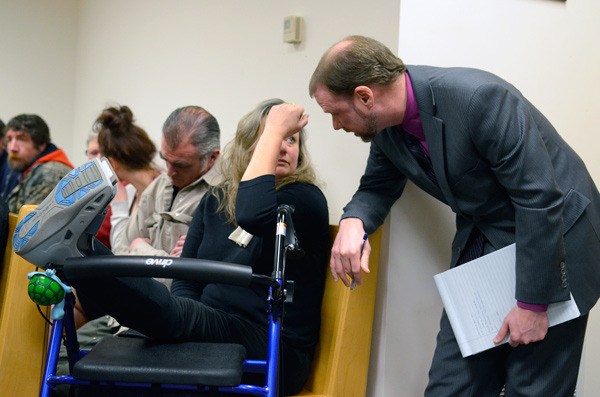Whether a vehicular homicide case against a South Whidbey woman goes to trial or not may depend heavily on the outcome of a court hearing next month.
A defense attorney for Michelle Nichols, the Clinton woman who is suspected of driving drunk in a 2015 crash that left a Freeland man dead, is expected to file a motion to suppress key evidence — the results of her blood tests — in time for a hearing next month. It’s impossible to say for sure, but how a judge rules could mean the difference of a trial or settlement, according to Island County Chief Criminal Prosecutor Eric Ohme.
“Either way, one of us is going to have a much better or worse case,” Ohme said following a Monday omnibus hearing for Nichols in Island County Superior Court.
Nichols has asked not to be contacted by The Record, and her lawyer, Langley attorney David Carman, was unavailable for comment by press time Tuesday.
Though a motion has not yet been filed, a suppression hearing is scheduled for April 29.
Nichols, 47, was southbound on Highway 525 on the evening of Feb. 14, 2015 when her vehicle crossed the centerline just past Coles Road. It resulted in a head-on collision with northbound driver Tim Keil. Nichols was airlifted to Harborview Medical Center in Seattle and Keil, 61, died at the scene.
After months of investigation by the Washington State Patrol, Nichols was charged Aug. 7 with one count of vehicular homicide under the “DUI prong” of the charge. It’s the most serious and carries the longest potential sentence, from 78 to 102 months in prison under the standard sentencing range.
She pleaded “not guilty” in September.
A conviction and a sentence, however, could be affected by next month’s hearing as the evidence that could be suppressed is an important part of the prosecution’s case. Blood samples taken from Nichols the night of the crash revealed a blood alcohol content of .11, which exceeds the legal state limit of .08.
The grounds for the suppression may be based on the circumstances in which the blood was drawn. Nichols was unconscious at the time, and state police did not have a warrant.
According to the state patrol’s referral to the Island County Prosecutor’s Office, the decision to take her blood for testing was made nearly three hours after the accident, when Nichols failed to wake to speak with the officer and after doctors had confirmed they had given her two units of blood.
“At 12:30 a.m., I contacted Nichols again and she was still unconscious,” Trooper Ryan Hagreen wrote. “I informed Nichols that she was under arrest for vehicular homicide and read Nichols her Miranda warnings from my department issue card. … Nichols remained unconscious and unresponsive from the time I arrived at Harborview Medical Center until the time I left.”
According to court documents, Nichols’ blood was taken under what’s called “exigent circumstances” — matters of timeliness where evidence can disappear or a judge can’t be reached.
Keil’s widow, Mary Jo Keil, attended Monday’s hearing with family friend, Barbara Benway. Speaking with The Record afterwards, Keil expressed frustration at the speed of the legal process and delays.
“It’s been over a year and we’re still waiting to go to trial,” she said. “It’s all about her rights, not Tim’s.”
She added that she believes the case will eventually go to trial, regardless of the results of next month’s hearing, but worries that it will affect the end result.
“My fear is justice won’t be done,” she said.
Keil is hoping Nichols will get eight and a half years in prison, the longest sentence under the standard range, but said even that is too short.



